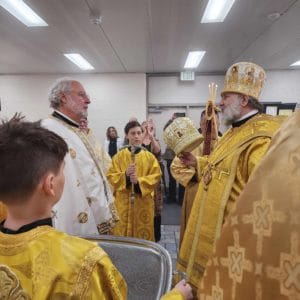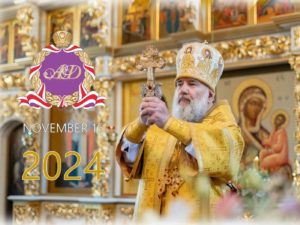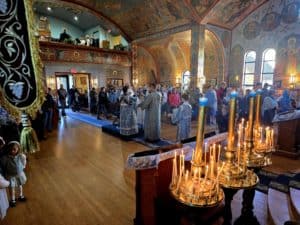“Do not pray for an easy life…”
Priest Alexander Koranda
If you were to walk into Archbishop Paul’s residence, you would discover a very simple arrangement of furniture with various adornments on the walls – most of which were gifts from his parishes when he would visit. Among the humble setting and décor, was a quote that was framed and hung in a place that is commonly traveled in the residence. The sign reads: “Do not pray for an easy life. Pray to be a strong person.”
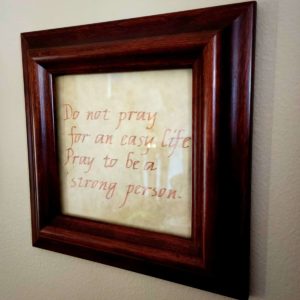 I remember reading this quote the first time and being immediately struck by its force. I wanted to ask His Eminence the story behind that quote – why it was there, where it was from, why it impressed him – but I was always distracted either by work or by a question he would ask me in the office, and my mind would move on. I never got the chance to ply him with my many questions, until my time with him in the last several months of his life. Then I received answers to my questions every single day.
I remember reading this quote the first time and being immediately struck by its force. I wanted to ask His Eminence the story behind that quote – why it was there, where it was from, why it impressed him – but I was always distracted either by work or by a question he would ask me in the office, and my mind would move on. I never got the chance to ply him with my many questions, until my time with him in the last several months of his life. Then I received answers to my questions every single day.
Archbishop Paul was a very important figure in my life. I was his first ordination, I travelled with him as his deacon, he appointed me as Dean of his Diocesan Cathedral and as the Communications Director for his diocese. I often think about how everything that I have as a priest is from God through the hands of Archbishop Paul. He would often say that we are joined together because he started his ministry as a bishop when I started my ministry as a clergyman in the Church. What he said was true; we were joined together. We prayed together, we worked together, we travelled together – we were together.
When working closely with His Eminence, one was able to tell when he was depressed, struggling, or worried about an impending decision that he would have to make. But often, after celebrating the Divine Liturgy, he seemed at peace and freed from all the usual burdens of the episcopacy. Otherwise, he was actively distracted by his responsibilities. One day in early February, I was with him celebrating a feast at a local parish. Something seemed different about him. He struggled to remember people’s names. One might think, what’s uncommon about this? This man meets and interacts with hundreds of people a week. How could he remember the names of those he sees so rarely? But Archbishop Paul took on this impossible task of remembering everyone’s name that he met, and he did it quite well. It was truly one of his gifts. Other signs indicated that something was off about his health, but this stood out because of his incredible recall.
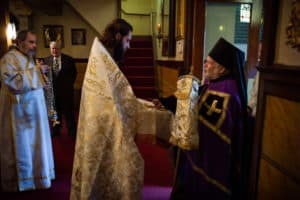 Shortly after this experience, I began talking about this with others who worked closely with him. All agreed that something had been different for some time and that we should get him in to see a doctor. Fr. Paul Jannakos, the Chancellor of the diocese, Philip Sokolov, the Archbishop’s secretary, and I sat down with His Eminence and told him we were concerned about his health, and that we wanted him to undergo testing at the hospital. He admitted that he was struggling to remember things, but said that he felt fine overall. He agreed that he would not travel for the weekend, or even drive his car, so that he could rest and take some time to recover. But shortly after that, he fell because of his ailing knee and he was forced to go to the hospital.
Shortly after this experience, I began talking about this with others who worked closely with him. All agreed that something had been different for some time and that we should get him in to see a doctor. Fr. Paul Jannakos, the Chancellor of the diocese, Philip Sokolov, the Archbishop’s secretary, and I sat down with His Eminence and told him we were concerned about his health, and that we wanted him to undergo testing at the hospital. He admitted that he was struggling to remember things, but said that he felt fine overall. He agreed that he would not travel for the weekend, or even drive his car, so that he could rest and take some time to recover. But shortly after that, he fell because of his ailing knee and he was forced to go to the hospital.
All of us, including His Eminence, were shocked by the diagnosis. I was devastated to learn that my Spiritual Father would be taken from me. The brain cancer was aggressive, relentless and unforgiving even after radiation.
From the moment he was admitted to the hospital, I was a regular visitor. Early on he would thank me but encourage me to use my time better in caring for my family and his cathedral. But it was important for me to be there with him – again, we were joined together; how could I leave him alone?
It seemed that each week saw his capabilities failing significantly. What started as a struggle with short-term memory led to the loss of motor functions until he was not able to walk. He lost his ability to speak, but he did remain aware of what was happening to him.
Still reeling from the initial fatal diagnosis and constantly hit by more bad news, I was trying to be a priest, a spiritual son, a friend. I would ask him how he felt about all that was happening to him. I was inspired by his calm and accepting answer that he wasn’t happy about it, but that it was what it was. A number of times, he expressed his desire to continue fighting the cancer in exchange for a little extra time to serve the diocese. He wanted to make sure things were in good order.
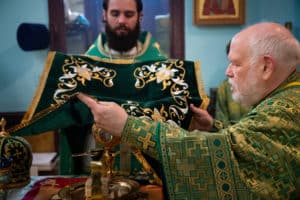 My Archbishop was not granted the time he desired. But when he was confronted each week with a new challenge, he met it with acceptance and dignity. The function in his right and dominant hand was taken away. So, he simply began learning how to eat and accomplish tasks with his left hand; he insisted he do it himself so that he could learn. When he was no longer able to walk, he insisted he be placed in a chair so that he could sit up and move himself around with his arms. When he was deprived of his strength physically to move, he moved his neck so that he could see and communicate. When he was no longer able to speak, he would communicate by squeezing your hand with his left hand. When, finally, he wasn’t able to move or even open his eyes, he was still very present in prayer. There was a sense of peace in the room that could be palpably felt by those who quietly gazed upon his ailing body.
My Archbishop was not granted the time he desired. But when he was confronted each week with a new challenge, he met it with acceptance and dignity. The function in his right and dominant hand was taken away. So, he simply began learning how to eat and accomplish tasks with his left hand; he insisted he do it himself so that he could learn. When he was no longer able to walk, he insisted he be placed in a chair so that he could sit up and move himself around with his arms. When he was deprived of his strength physically to move, he moved his neck so that he could see and communicate. When he was no longer able to speak, he would communicate by squeezing your hand with his left hand. When, finally, he wasn’t able to move or even open his eyes, he was still very present in prayer. There was a sense of peace in the room that could be palpably felt by those who quietly gazed upon his ailing body.
The sign reads: “Do not pray for an easy life. Pray to be a strong person.” Now, dear reader, you know what that means, why it was hanging, and its very purpose.
The Archbishop’s life was not easy. In the time I knew him, until his very last breath, it was not easy. But that was not what he prayed for; he prayed, rather, to be a strong person and to do the right thing, and it served him well. This is a final lesson taught to me by His Eminence not only in text but also in deed, and I’m grateful for it.

